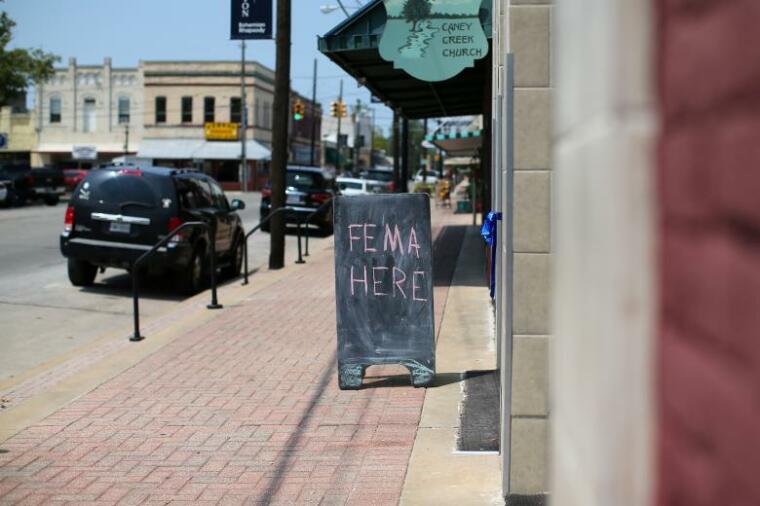House committee approves bill that would allow churches to receive FEMA aid

A congressional committee has advanced a legislation that would allow churches, mosques, synagogues and other faith-based centers to receive federal disaster relief funds.
The Disaster Recovery Reform Act, also known as H.R. 4460, is expected to move to the House floor for deliberation after it was approved by the House Transportation and Infrastructure Committee on Thursday, Religion News Service (RNS) reported.
Lawmakers from both sides of the aisle expressed support for the measure despite concerns that using taxpayer funds to build places of worship would violate the separation of church and state.
The introduction of the bill came in the wake of several storms that ravaged Puerto Rico, Florida and the Texas coastline, as well as wildfires in October that swept across Northern California, where the damage has been estimated at more than $1 billion.
RNS noted that First Amendment issues were not brought up at the committee hearing, but the lawmakers discussed other aspects of the bill, such as requirements for competitive bidding after a tiny Montana firm received a $300 million contract to repair Puerto Rico's electricity infrastructure damaged by Hurricane Maria in September.
Proponents of the bill have argued that religious groups are being unfairly disadvantaged as they are often at the forefront of disaster relief efforts.
In September, three churches in Texas sued the Federal Emergency Management Agency (FEMA), arguing that its policy banning aid to religious nonprofits violates the First Amendment.
One of the churches that filed the lawsuit, the Hi-Way Tabernacle in Cleveland, had housed 70 people displaced by Hurricane Harvey despite suffering flood damage.
The church, located 55 miles northeast of Houston, had also served as a staging center for FEMA, which distributed more than 8,000 emergency meals, according to the churches' attorney, Daniel Blomberg with the Becket Fund for Religious Liberty in Washington, D.C.
Last month, U.S. District Judge Keith Ellison rejected FEMA's request to halt the case, and gave the agency until Dec. 1 to respond to either defend its church-aid policy or come up with a new one.
"If, by December 1, FEMA's position remains unchanged, the court will assume that FEMA concedes, at the very least, plaintiffs' likelihood of success on the merits of this case and that the injury being suffered by plaintiffs is irreparable," the judge wrote.
The churches' lawsuit noted that FEMA does not offer disaster-relief grants to businesses, but nonprofit organizations that provide "noncritical but essential government services" to the public may be eligible.
Ellison further stated that the agency's policy of evaluating nonprofits based on the services they provide "creates complications" because nonprofits "frequently provide multiple services to their communities."
A day before the Dec. 1 deadline, Ellison reportedly recused himself and the case was reassigned to U.S. District Judge Gray H. Miller on Friday.
Ellison did not disclose his reasoning as the law does not require judges to explain why they are withdrawing from a case.
 Christians don't have to affirm transgenderism, but they can’t express that view at work: tribunal
Christians don't have to affirm transgenderism, but they can’t express that view at work: tribunal Archaeology discovery: Medieval Christian prayer beads found on Holy Island
Archaeology discovery: Medieval Christian prayer beads found on Holy Island Presbyterian Church in America votes to leave National Association of Evangelicals
Presbyterian Church in America votes to leave National Association of Evangelicals Over 50 killed in 'vile and satanic' attack at Nigerian church on Pentecost Sunday
Over 50 killed in 'vile and satanic' attack at Nigerian church on Pentecost Sunday Ukrainian Orthodox Church severs ties with Moscow over Patriarch Kirill's support for Putin's war
Ukrainian Orthodox Church severs ties with Moscow over Patriarch Kirill's support for Putin's war Islamic State kills 20 Nigerian Christians as revenge for US airstrike
Islamic State kills 20 Nigerian Christians as revenge for US airstrike Man who served 33 years in prison for murder leads inmates to Christ
Man who served 33 years in prison for murder leads inmates to Christ


 Nigerian student beaten to death, body burned over ‘blasphemous’ WhatsApp message
Nigerian student beaten to death, body burned over ‘blasphemous’ WhatsApp message 'A new low': World reacts after Hong Kong arrests 90-year-old Cardinal Joseph Zen
'A new low': World reacts after Hong Kong arrests 90-year-old Cardinal Joseph Zen Iran sentences Christian man to 10 years in prison for hosting house church worship gathering
Iran sentences Christian man to 10 years in prison for hosting house church worship gathering French Guyana: Pastor shot dead, church set on fire after meeting delegation of Evangelicals
French Guyana: Pastor shot dead, church set on fire after meeting delegation of Evangelicals ‘Talking Jesus’ report finds only 6% of UK adults identify as practicing Christians
‘Talking Jesus’ report finds only 6% of UK adults identify as practicing Christians Mission Eurasia ministry center blown up in Ukraine, hundreds of Bibles destroyed: 'God will provide'
Mission Eurasia ministry center blown up in Ukraine, hundreds of Bibles destroyed: 'God will provide' Church holds service for first time after ISIS desecrated it 8 years ago
Church holds service for first time after ISIS desecrated it 8 years ago Burger King apologizes for 'offensive campaign' using Jesus' words at the Last Supper
Burger King apologizes for 'offensive campaign' using Jesus' words at the Last Supper Uganda: Muslims abduct teacher, burn him inside mosque for praying in Christ’s name
Uganda: Muslims abduct teacher, burn him inside mosque for praying in Christ’s name